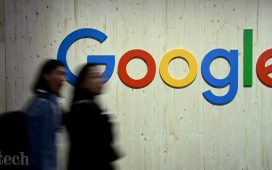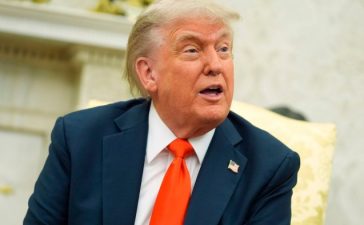Lina Khan, chair of the U.S. Federal Trade Commission, and Jonathan Kanter, assistant attorney general for the Justice Department’s antitrust division, participate in a discussion on antitrust reforms at the Brookings Institution in Washington on Oct. 4, 2023. Khan assumed the role of FTC chair in June 2021 after being appointed by U.S. President Joe Biden and confirmed by the Senate.
Drew Angerer | Getty Images
Google had been in talks to acquire marketing software maker HubSpot earlier this year, but no deal took place. The company then made a run at cybersecurity startup Wiz. But that didn’t happen either.
Google took a different tactic in closing its one notable transaction of late. Following a model pursued by Amazon and Microsoft to lure experts in artificial intelligence, Google announced last month it was hiring the founders of generative AI startup Character.AI. Rather than buying Character outright and shutting it down — the standard acquihire playbook — Google kept the startup alive and entered into a licensing deal for its technology.
This is the new world of tech M&A. Under the Biden administration, and more specifically Federal Trade Commission head Lina Khan, the biggest companies have been thwarted from pursuing large deals. In some cases, they’ve even walked away from smaller deals. Amazon abandoned its $1.7 billion purchase of iRobot in January after the FTC and European regulators raised concerns.
Since peaking at $1.5 trillion in 2021, tech transaction volume has plummeted, dropping to $544 billion last year, according to Dealogic. So far in 2024, that number sits at $465 billion.
Within tech, private equity buyers are the ones keeping the market afloat. In July, BlackRock agreed to buy data provider Preqin for $3.2 billion, two months after Permira announced it was buying website-building platform Squarespace in a deal valued at almost $7 billion. Thoma Bravo, a leading tech buyout firm, said in July it was selling Instructure to KKR for $4.8 billion.
Don’t expect much to change for the rest of this year. With the presidential election coming in November, the regulatory environment could be poised for a shake-up, potentially leading to the removal of deal-making barriers.
However, neither party offers much clarity for what the future would bring. Sen. JD Vance, Donald Trump’s running mate on the Republican ticket, has praised Khan’s stricter rules on mergers, and he told CNBC last week that “there should be an antitrust solution” to some of the behaviors of large tech platforms.

On the Democratic side, billionaire donors Barry Diller and Reid Hoffman have voiced concerns about Khan keeping her job if Vice President Kamala Harris wins.
“If Trump wins, I think that the regulatory environment will still be fairly challenging, and under a challenging regulatory environment, that just limits big deals,” said Andrew Luh, a partner at law firm Gunderson Dettmer who represents startups in mergers and acquisitions.
The Biden administration’s crackdown on Big Tech has gone well beyond squashing M&A.
Alphabet is in the midst of its second antitrust trial, following charges from the Justice Department that the company acted as a monopoly in search and advertising. The DOJ sued Apple on antitrust grounds in March. The FTC has cases pending against Meta and Amazon.
Couple that with a similarly rigid environment in Europe, and no deal appears safe. In December, Adobe walked away from its $20 billion agreement to purchase design software startup Figma, and paid a $1 billion breakup fee. In a statement, the companies said, “there is no clear path to receive necessary regulatory approvals from the European Commission and the UK Competition and Markets Authority.”
In July, Figma said it had completed a tender offer valuing the design software startup at $12.5 billion. Figma is viewed as a strong IPO candidate when that market eventually reopens. But alongside a plummeting M&A market, initial public offerings are also in an extended drought as companies continue to adapt to drastically reduced valuations wrought by the economic slowdown starting in 2022.
A Figma spokesperson declined to comment on the company’s plans.
Dana Rao, who at the time was Adobe’s general counsel, announced his departure earlier this month after 12 years at the company. Rao said in a December interview that Adobe leadership felt justified in pursuing Figma after the failure of its competing product design program. But regulators were taking a different view.
“We’ve had a lot of interaction with the regulators, and they’ve been very focused on the newer doctrines of antitrust law that say that future competition is a critical part of the antitrust analysis,” he said.
Jonathan Kanter, head of the Justice Department’s Antitrust Division, said in a statement after Adobe backed down that the move “ensures that designers, creators, and consumers continue to get the benefit of the rivalry between the two companies going forward.”
‘Very, very disciplined’
There are still deals taking place, outside the watchful eye of regulators.
Hewlett Packard Enterprise agreed in January to acquire networking hardware company Juniper for $14 billion. And this month, Salesforce said it was buying startup Own for $1.9 billion.
In those cases, management was less concerned about regulators and much more focused on how shareholders would respond due to the growing obsession with profitability, following the 2022 downturn.
US company Hewlett Packard Enterprise President and Chief Officer Executive Antonio Neri gives a conference at the Mobile World Congress (MWC), the telecom industry’s biggest annual gathering, in Barcelona on February 27, 2024.
Pau Barrena | AFP | Getty Images
HPE CEO Antonio Neri told CNBC that Juniper would add to non-GAAP earnings in year one.
“We have been very, very disciplined on returning invested capital, meaning every dollar spent has to deliver value to our shareholders,” Neri said in an interview. “And that’s why, in the case of Juniper, for example, we committed to a series of synergies that then more than pay for the cost of capital to make this acquisition.”
Neri told analysts in January that the two companies do business in some of the same markets, but in different verticals, and said that he didn’t anticipate protracted battles with regulators. In August, the U.K.’s Competition and Markets Authority approved the tie-up.
Sergio Letelier, HPE’s head of corporate development, said that when he and his team members advise Neri on a potential deal, they always discuss how regulators might treat it. While some transactions are taking longer to close than they would have previously, “the fundamentals of what is a problematic deal vs. what is not a problematic deal hasn’t changed,” Letelier said.
At Salesforce, CEO Marc Benioff said that Own should bolster free cash flow in the second year after the deal closed. It’s Benioff’s first billion-dollar-plus acquisition since 2021, when the cloud software vendor paid $27 billion for Slack, its largest purchase ever. The DOJ’s Antitrust Division asked for additional information on that deal before clearing it.
In an interview last week, Benioff called U.S. regulators “somewhat dysfunctional” but applauded Europe for recognizing where competition really is being harmed. He specifically pointed to a recent finding by the European Commission, the executive body of the European Union, that Microsoft had breached antitrust rules by tying Teams, its Slack competitor, to its core Office productivity applications.
“They’re the ones who are actually functional and who are doing serious work,” Benioff said, referring to the EU and U.K. “I think that it’s a big story that we’re following the Europeans in this regulatory environment.”
Since the Slack purchase, Salesforce has pursued only smaller deals, particularly after facing off with activist investors who pressured the company to put a renewed focus on profitability. Salesforce landed AI talent from buying Airkit and a Sales Cloud software add-on from Spiff.
“We’ve done more than 60 acquisitions,” Benioff said. “We’ve tried and failed a lot in M&A, but we have also succeeded in quite a few of them, especially the big ones.” Before Slack, Salesforce acquired Tableau Software and MuleSoft.
Hard to be confident
At Cisco, one of the first questions executives ask when evaluating a potential deal is how certain they are it will close, said Derek Idemoto, the networking hardware company’s head of corporate development.
“The question is, How much risk are you willing to take on the regulatory side, given how hard things are at this time and how litigious things could be,” said Idemoto, who’s worked on more than 100 deals in his nearly 17 years at the company.
Idemoto said that’s made Cisco more selective these days. Before the company announced its $27 billion purchase of data analytics software company Splunk last September, he said he viewed the risk as absolutely worth taking. Splunk sat comfortably outside Cisco’s core of networking equipment.
“Certainly it’s an offensive play for us,” Idemoto said.
The deal sailed through, even closing in March, six months ahead of schedule.
“Having a high confidence level when you sign something — that’s the Cisco way,” Idemoto said.
That level of confidence would be difficult for the megacap companies as long as the FTC and DOJ are aggressively watching them. Alphabet’s last big deal was its $5.4 billion purchase of cybersecurity company Mandiant in 2022. Microsoft closed its massive $75 billion purchase of Activision in October, but it took 20 months and a protracted fight with U.S. and European regulators. Amazon hasn’t had a billion-dollar-plus deal since closing the $3.9 billion acquisition of One Medical in early 2023.
Last month, Amazon announced it was hiring a quarter of staffers from Covariant, which builds AI models for robots. It was the company’s second AI deal in the acquihire vein, following a similar agreement with Adept in June. Even that deal attracted an informal FTC inquiry.
Amazon didn’t provide a specific comment for this story, but said acquisitions are still part of its growth strategy and “are a critical and healthy part of an innovation economy.” Microsoft and Google declined to comment.
HPE’s Letelier said that any tech company considering its acquisition strategy will have a difficult time forecasting for the future because it’s not clear what changes Vice President Harris might make if she wins in November or what Trump would do if he returns to the White House.
Trump as president blocked some deals on national security grounds, following recommendations from the Committee on Foreign Investment in the United States. Regulators under President Joe Biden, meanwhile, have filed a record number of merger enforcement actions, Bloomberg reported.
“We’re at a crossroads here, and we don’t know which side of the fork the policy is going to go,” Letelier said.
WATCH: How Big Tech is quietly acquiring AI startups without actually buying the companies












